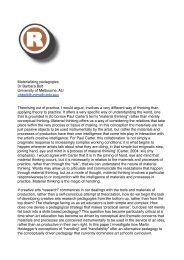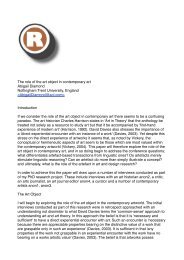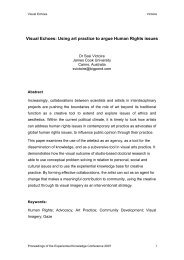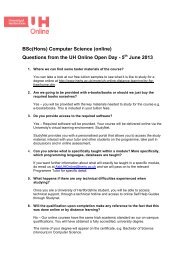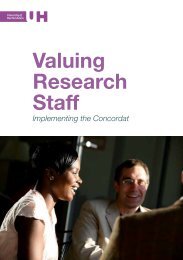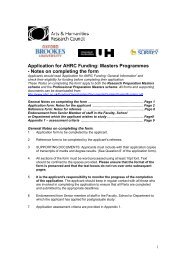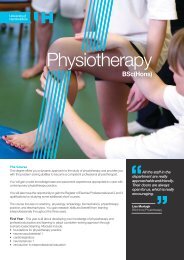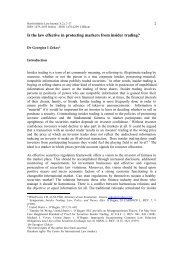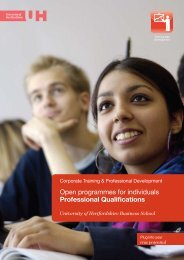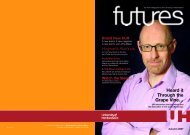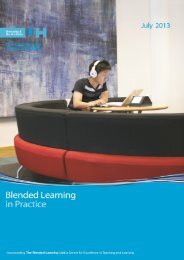Programme specification (pdf) - University of Hertfordshire
Programme specification (pdf) - University of Hertfordshire
Programme specification (pdf) - University of Hertfordshire
You also want an ePaper? Increase the reach of your titles
YUMPU automatically turns print PDFs into web optimized ePapers that Google loves.
School <strong>of</strong> Life and Medical SciencesTitle <strong>of</strong> <strong>Programme</strong>: Master <strong>of</strong> Arts/Postgraduate Diploma in ContemporaryTherapeutic Counselling<strong>Programme</strong> Code: HHMAC<strong>Programme</strong> SpecificationThis programme <strong>specification</strong> is relevant to students entering:16 September 2013Associate Dean <strong>of</strong> School (Academic Quality Assurance):Philomena ShaughnessySignature
<strong>Programme</strong> Specification Master <strong>of</strong> Arts/PostgraduateDiploma in ContemporaryTherapeutic CounsellingThis programme <strong>specification</strong> (PS) is designed for prospective students, enrolled students,academic staff and potential employers. It provides a concise summary <strong>of</strong> the main features <strong>of</strong>the programme and the intended learning outcomes that a typical student might reasonably beexpected to achieve and demonstrate if he/she takes full advantage <strong>of</strong> the learningopportunities that are provided. More detailed information on the teaching, learning andassessment methods, learning outcomes and content for each module can be found inDefinitive Module Documents (DMDs) and Module Guides.Section 1Awarding Institution/Body <strong>University</strong> <strong>of</strong> <strong>Hertfordshire</strong>Teaching Institution <strong>University</strong> <strong>of</strong> <strong>Hertfordshire</strong><strong>University</strong>/partner campuses Hatfield Meridian House<strong>Programme</strong> accredited by British Association for Counselling and Psychotherapy (PgD part)Final AwardMA/PgDAll Final Award titles Contemporary Therapeutic CounsellingFHEQ level <strong>of</strong> awardLanguage <strong>of</strong> Delivery7English type all languages that have been approvedA. <strong>Programme</strong> RationaleThe MA/PgD programme is aimed at those students who are seeking to gain both an academic awardand pr<strong>of</strong>essional recognition as counsellors. It will give them an opportunity to gain a PostgraduateDiploma in Contemporary Therapeutic Counselling (Modules 1-4) which is accredited by the BritishAssociation for Counselling (BACP) and to achieve competence in practitioner research and the award<strong>of</strong> MA in Contemporary Therapeutic Counselling by completing Module 5, in addition. The PgD/MAprogramme will be <strong>of</strong> particular interest to those working within health care service provision, socialservices, teaching, pastoral work and other areas <strong>of</strong> both the public and private sector wherecounselling is relevant. The inclusive approach to counselling (see: below) which underpins thisprogramme should encourage participation from a wide pool <strong>of</strong> students.This innovative and contemporary programme seeks to provide students with an opportunity to developtheir own individual, critically reflective and non-doctrinaire approach to counselling within a broadlypsychodynamic framework. The following key elements will underpin this approach:A pluralistically psychodynamic approach to counselling: this includes fundamental psychodynamicprinciples and a range <strong>of</strong> understandings <strong>of</strong> notions <strong>of</strong> human nature, being in relation and distressPhenomenology: this encourages students to consider diverse ways <strong>of</strong> understanding humannature, being in relation and distressSocial constructionism: this enables students to explore the social, political, cultural andorganisational contexts within which counselling takes place, to consider the cultural specificity <strong>of</strong>counselling values, assumptions and practices and how these relate both to themselves aspractitioners and to their clientsComparative approaches to psychopathology: this gives students the opportunity to develop acritical understanding <strong>of</strong> comparative theoretical and clinical approaches to human distress. This willbroaden their experience, enable them to familiarise themselves with the language <strong>of</strong>V1.6 / Postgraduate <strong>Programme</strong> Specification / January 2013 / AS© <strong>University</strong> <strong>of</strong> <strong>Hertfordshire</strong> 20122
Develop students' understanding <strong>of</strong> qualitative research methodology, with particular reference topractitioner researchProvide students with the opportunity to consider critically the relevance <strong>of</strong> research findings to theirwork as practitionersDevelop students' practical and critical understanding <strong>of</strong> the ethical, pr<strong>of</strong>essional, legal, social andorganisational contexts within which counselling takes place and how these relate to their work aspractitionersMA:In addition to the above, the programme aims to:Provide students with the opportunity to complete a substantial piece <strong>of</strong> work which demands theuse <strong>of</strong> appropriate case study methods <strong>of</strong> enquiry and skills to examine critically a dilemma or issuefrom client work practiceEncourage students to develop insights that are <strong>of</strong> demonstrable value to the ethical practice <strong>of</strong>counselling and to the counselling field in generalC. Intended Learning OutcomesThe programme provides opportunities for students to develop and demonstrate knowledge andunderstanding, skills and other attributes in the following areas. The programme outcomes arereferenced to the Framework for Higher Education Qualifications in England, Wales and NorthernIreland (2008), and relate to the typical student. Additionally, the SEEC Credit Level Descriptors forFurther and Higher Education 2010 have been used as a guiding framework for curriculum design.Knowledge andUnderstanding <strong>of</strong>:Students will be able to:A1- Present a clear , criticallyinformed theoretical basisfor their counsellingpractice within apsychodynamicframeworkA2- Demonstrate a criticalunderstanding <strong>of</strong> thesocial, political andcultural contexts withinwhich counselling takesplace, the culturalspecificity <strong>of</strong> counsellingtheories, values and howthese relate both to theirclients and to themselvesas practitionersA3- Achieve a criticalunderstanding <strong>of</strong>comparative approachesto psychopathology inorder to locatethemselves within currenttheoretical paradigmsA4- Demonstrate a criticalunderstanding <strong>of</strong> ethical,pr<strong>of</strong>essional, legal issuesand organizationaldynamics andrequirements and howTeaching/learning methods &strategiesAcquisition <strong>of</strong> knowledge andunderstanding is through thefollowing:A1 skills are acquired throughseminar-based learning anddeveloped through directed studyand facilitated discussion <strong>of</strong>specific comparative texts andworkshop presentations,counselling practice sessions,group client work supervision,individual and group tutorials,client work in a clinical placementand individual and group MAdissertation supervisionA2 and A3 skills are acquiredthrough a combination <strong>of</strong> a study<strong>of</strong> texts linked to seminar basedlearning, counselling practicesessions, group client worksupervision, individual and grouptutorials, client work in a clinicalplacement setting and the Work-Based Learning (WBL) processA4 skills are acquired through acombination <strong>of</strong> seminar basedlearning, counselling practicesessions, group client worksupervision, PersonalDevelopment (PD) group,individual and group tutorials,AssessmentKnowledge andunderstanding are assessedthrough the following:A1 skills are tested through acombination <strong>of</strong> essays,workshoppresentations(formative),critique <strong>of</strong> video-tapedcounselling sessions, casestudy, summative statement<strong>of</strong> pr<strong>of</strong>essional and personaldevelopment, supervisors’reports (formative), Work-Based Learning (WBL)Assessment and MAdissertationA2 skills are tested through acombination <strong>of</strong> essays, casestudy, summative statement<strong>of</strong> pr<strong>of</strong>essional and personaldevelopment, WBLassessment and MAdissertationA3 skills are tested through acombination <strong>of</strong> essays andsummative statement <strong>of</strong>personal and pr<strong>of</strong>essionaldevelopmentA4 skills are tested through acombination <strong>of</strong> essays, casestudy, summative statementV1.6 / Postgraduate <strong>Programme</strong> Specification / January 2013 / AS© <strong>University</strong> <strong>of</strong> <strong>Hertfordshire</strong> 20124
these relate to theircounselling practiceA5- Demonstrate a criticalunderstanding <strong>of</strong> currentqualitative approaches toresearch in counsellingand current debates andcontroversies incounselling researchA6- Demonstrate a criticalunderstanding <strong>of</strong> theprinciples <strong>of</strong> case studymethodology as anapproach to practitionerresearch. This will includean identification <strong>of</strong> theadvantages andlimitations and inherentparadoxes <strong>of</strong> thisapproach as a method <strong>of</strong>research. Comparison willbe made with one othermethod relevant tocounselling*A7- Demonstrate a criticalunderstanding <strong>of</strong> theimplications andapplications <strong>of</strong> their casestudy research to theethical practice <strong>of</strong>counsellingA8- Demonstrate anunderstanding that anytraining in this field isincomplete. This includesa realistic appraisal <strong>of</strong> thelimitations both <strong>of</strong>themselves ascounsellors and <strong>of</strong> thecounselling process ingeneral and acommitment to continuedpersonal and pr<strong>of</strong>essionaldevelopmentclient work in a clinical placementsetting and WBL processA5 skills are acquired through acombination <strong>of</strong> seminar basedlearning, individual and grouptutorials and MA dissertationsupervisionA6 skills are acquired through acombination <strong>of</strong> seminar-basedlearning and individual and groupMA dissertation supervisionA7 skills area acquired through acombination <strong>of</strong> seminar-basedlearning and individual and groupMA dissertation supervision,group client work supervision andclient work in a clinical placementThat counselling training isincomplete and students shouldbe open to continued learning(A8) is emphasised at every level<strong>of</strong> the programme. This isparticularly emphasised through acombination <strong>of</strong> seminar-basedlearning, counselling practicesessions and individual and grouptutorials. The importance <strong>of</strong>ongoing CPD is emphasized inthe WBL process.Additional support: students arerequired to attend one to one,once a week ongoing personalcounselling/psychotherapy withan accredited practitioner for theduration <strong>of</strong> the programme. Thiswill encourage a critical, selfreflective approach to their workas practitioners and enable themto integrate theoreticalunderstanding with practice at anexperiential and embodied level.Throughout, the learner isencouraged to undertakeindependent study both tosupplement and consolidate whatis being taught and to broadentheir individual knowledge andunderstanding <strong>of</strong> the subject.Throughout, the learner isencouraged to undertakeindependent study both tosupplement and consolidate whatis being taught/learnt and tobroaden their individualknowledge and understanding <strong>of</strong>the subject.<strong>of</strong> pr<strong>of</strong>essional and personaldevelopment, WBLassessment and MAdissertationA5 skills are tested through acombination <strong>of</strong> essays,summative statement <strong>of</strong>pr<strong>of</strong>essional and personaldevelopment and MAdissertationA6 skills are tested throughthe final SummativeStatement <strong>of</strong> Personal andPr<strong>of</strong>essional Developmentand MA dissertationA7 skills are tested throughMa dissertationThe incompleteness <strong>of</strong>training in this field and theimportance <strong>of</strong> openness tocontinued learning (A8) arerecognised in all assessmentprocedures and areparticularly tested in essays,case study, summativestatement <strong>of</strong> personal andpr<strong>of</strong>essional development,the WBL assessment andMA dissertationV1.6 / Postgraduate <strong>Programme</strong> Specification / January 2013 / AS© <strong>University</strong> <strong>of</strong> <strong>Hertfordshire</strong> 20125
particular, awareness <strong>of</strong> theirown processes and ways <strong>of</strong>relating to others and thebearing that these mighthave on their counsellingpractice. They will alsodemonstrate an ability toidentify and examinecritically their own culturalassumptions, values andprejudices that might inhibitan open and ethicalengagement with the clientC6. Achieve competence inpractitioner research, usingcase study methodologyC7. Present acomprehensive and coherentanalytic studyC8. Demonstrate a criticalawareness both <strong>of</strong> theadvantages and limitations <strong>of</strong>their (dissertation) study andany difficulties andparadoxes in relation to thestudyC4 skills are acquired throughcounselling practice sessions,group client work supervision,group tutorials, PD group, clientwork in a clinical placement andMA dissertation supervisionC5 skills are acquired throughcounselling practice sessions,group client work supervision,individual and group tutorials, PDgroup, client work in a clinicalplacement, individual and groupMA dissertation supervision andpersonalcounselling/psychotherapy andWBL processC6 skills are acquired throughseminar-based learning andindividual and group MAdissertation supervisionC7 skills are acquired throughseminar-based learning andindividual and group MAdissertation supervisionC8 skills are acquired throughseminar-based learning andindividual and group MAdissertation supervisionstudy, supervisors’ reports(formative) and MAdissertationC4 skills are tested through acombination <strong>of</strong> essays, casestudy, critique <strong>of</strong> video-tapedsession, summativestatement <strong>of</strong> pr<strong>of</strong>essionaland personal development,WBL assessment and MAdissertationC5 skills are tested through acombination <strong>of</strong> essays,workshoppresentations(formative),critique <strong>of</strong> video-tapedcounselling sessions, casestudy, summative statement<strong>of</strong> pr<strong>of</strong>essional and personaldevelopment, supervisors’reports (formative), WBLprocess and MA dissertationC6 skills are tested throughthe MA dissertationC7 skills are tested throughthe MA dissertationC8 skills are tested throughthe MA dissertationTransferable skills - able to:D1. Use informationtechnologyD2. Mount a well presentedargumentD3. Work as a member <strong>of</strong>the teamD4. Communicate clearlyandlogically in writtenand spoken EnglishD5. Achieve competence inqualitative researchskillsD6. Exercise initiative andpersonal responsibilityTeaching/learning methods &strategiesTransferable skills are developedthrough the following:D1 skills are acquired through theuse <strong>of</strong> texts in preparation forseminar based learning andseminar presentation and throughthe preparation for assessment(see: below)D2 skills are acquired throughseminar-based learning, seminarpresentation and the WBLprocessD3 skills are acquired throughseminar presentation, client workgroup supervision, PD group,group tutorials, client work in aclinical placement, WBL processand MA dissertation groupsupervisionAssessmentTransferable skills areassessed through thefollowing:D1 skills are tested in thestudents’ presentation <strong>of</strong> allwritten assessmentsD2 skills are tested inessays, case study,summative statement <strong>of</strong>pr<strong>of</strong>essional and personaldevelopment, WBLassessment and MAdissertationD3 skills are tested inessays, seminarpresentations (formative),WBL assessment andsupervisors’ reports(formative)V1.6 / Postgraduate <strong>Programme</strong> Specification / January 2013 / AS© <strong>University</strong> <strong>of</strong> <strong>Hertfordshire</strong> 20127
D7. Demonstrate decisionmakingin complex andunpredictable situationsD8. Demonstrateindependent learning abilityrequired for continuouspr<strong>of</strong>essional developmentD4 skills are acquired at all levels<strong>of</strong> the programmeD5 skills are acquired throughseminar-based learning andindividual and group MAdissertation supervisionD6 skills are acquired throughseminar-based learning, seminarpresentation, preparation forassessments (see, below), clientwork group supervision, grouptutorials, client work in a clinicalplacement setting, PD group,WBL process and group andindividual MA dissertationsupervisionD7 skills are acquired throughseminar-based learning, seminarpresentation, counselling practicesessions, client work groupsupervision, client work in aclinical placement setting, WBLprocess and PD groupD8 skills are acquired throughseminar-based learning, seminarpresentation, counselling practicesessions, preparation forassessments (see, below), clientwork group supervision, grouptutorials, client work in a clinicalplacement setting, PD group andgroup, WBL process andindividual MA dissertationsupervisionD4 skills are tested in allassessmentsD5 skills are tested in the MAdissertationD6 skills are tested in allwritten assessmentsD7 skills are tested in thecritique <strong>of</strong> a video-tapedcounselling session, seminarpresentations, case study,summative statements <strong>of</strong>personal and pr<strong>of</strong>essionaldevelopment, WBLassessment and MAdissertationD8 skills are tested in allwritten assessmentsThroughout, the learner isencouraged to developtransferable skills by maintaininga record <strong>of</strong> evidence andcompleting a personaldevelopment plan.D. <strong>Programme</strong> Structures, Features, Levels, Modules, and CreditsThis programme is <strong>of</strong>fered as part time, two calendar years plus two semesters and consists <strong>of</strong> fiveconsecutive compulsory modules and leads to an award <strong>of</strong> MA in Contemporary TherapeuticCounselling. Year 1 consists <strong>of</strong> Modules 1 (7SCH0043) and 2 (7SCH0044). Year 2 consists <strong>of</strong> Modules3 (7SCH0045) and 4 (7SCH0046) and Year 3 consists <strong>of</strong> a three semester module, Module 5(7SCH0047), i.e. Semester C <strong>of</strong> the previous academic year and Semesters A and B <strong>of</strong> the thirdV1.6 / Postgraduate <strong>Programme</strong> Specification / January 2013 / AS© <strong>University</strong> <strong>of</strong> <strong>Hertfordshire</strong> 20128
Module CodeCredit PointsLanguage <strong>of</strong>Delivery% Examination% Coursework% PracticalSemestersacademic year.Successful completion <strong>of</strong> Years One and Two (four compulsory, consecutive modules) <strong>of</strong> thisprogramme will lead to an award <strong>of</strong> Postgraduate Diploma in Contemporary Therapeutic Counselling.The PgD element <strong>of</strong> this programme is accredited by the British Association for Counselling andPsychotherapy and provides the required training element for application for pr<strong>of</strong>essional accreditationas counsellor with the BACP (see: section 2).Successful completion <strong>of</strong> Years One, Two and Three (five compulsory, consecutive modules) <strong>of</strong> thisprogramme will lead to an award <strong>of</strong> MA in Contemporary Therapeutic Counselling. The gap betweenmodules 4 and 5 should be no longer than two years. Students who were awarded a PgD inContemporary Therapeutic Counselling at the end <strong>of</strong> Module 4 will be required to relinquish this awardprior to being awarded the MA in Contemporary Therapeutic Counselling.Entry onto the MA/PgD programme is normally at Year One, but it is possible at Year Two (see: section20, Entry Requirements). It is also possible to enter directly at year Two (see section 1 F). Directentrants to Year Two <strong>of</strong> the MA/PgD programme will not be deemed by the BACP to have completed anaccredited programme and will be eligible for apply for individual accreditation with the BACP.Pr<strong>of</strong>essional and Statutory Regulatory BodiesThe first two years (Modules 1-4) <strong>of</strong> the MA/Postgraduate Diploma in Contemporary TherapeuticCounselling, i.e. the Postgraduate Diploma, is a BACP accredited programme. The PgD wasreaccredited by the BACP in December 2012 and is due for re-accreditation in 2017.Successful completion <strong>of</strong> the first two years <strong>of</strong> the MA/ Postgraduate Diploma in ContemporaryTherapeutic Counselling programme, i.e. the Postgraduate Diploma, fulfils the required training elementnecessary for individual application to become an accredited counsellor with the BACP. This includesthe achievement <strong>of</strong> 120 supervised one to one regular client work practice hours in a placementapproved by the programme team. In addition to and following on from this training element, studentsare required to complete an application process and further supervised one to one client work practicehours in order to achieve a minimum <strong>of</strong> 450 supervised one to one client work practice hours in total.Students’ practice will adhere to the BACP Ethical Framework. They are required to become studentmembers <strong>of</strong> the BACP for the duration <strong>of</strong> the PgD part <strong>of</strong> the programme (see Section 2: <strong>Programme</strong>Specific Assessment Regulations). For full accreditation requirements, see http://www.bacp.co.uk.Direct entrants to Year Two <strong>of</strong> the MA/PgD programme will not be deemed by the BACP to havecompleted an accredited programme. In order to apply for individual accreditation with the BACP ascounsellor they must demonstrate that they have completed 450 hours <strong>of</strong> training in the theory andpractice <strong>of</strong> counselling. For full accreditation requirements, see: http://www.bacp.co.uk.<strong>Programme</strong> StructureThe programme structure and progression information below (Table 1a and 1b) is provided for theaward. Any interim awards are identified in Table 1b. The <strong>Programme</strong> Learning Outcomes detailedabove are developed and assessed through the constituent modules. Table 2 (in section 2) identifieswhere each learning outcome is assessed.Table 1a Outline <strong>Programme</strong> StructureCompulsory ModulesModule TitleModule 1: Theory and Practice <strong>of</strong>Counselling 1Module 2: Theory and Practice <strong>of</strong>Counselling 27SCH0043 30 English 0 100% 0 AB7SCH0044 30 English 0 100% 0 BV1.6 / Postgraduate <strong>Programme</strong> Specification / January 2013 / AS© <strong>University</strong> <strong>of</strong> <strong>Hertfordshire</strong> 20129
Module 3: Critical Approaches to 7SCH0045 30 English 0 100% 0 ABPsychopathologyModule 4: Research Methods and 7SCH0046 30 English 0 100% 0 BCPr<strong>of</strong>essional and Ethical IssuesModule 5: MA Dissertation 7SCH0047 60 English 0 100% 0 CABThe award <strong>of</strong> an MA in Contemporary Therapeutic Counselling degree requires 180 credit pointspassed at level 7 including the Masters degree dissertation.All MA/PgD in Contemporary Therapeutic Counselling modules are compulsory and will be takenconsecutively, as above. There are no optional modules. Modules 1-2 (Year 1) must be completedsuccessfully before progression onto Modules 3-4 (Year 2). Modules 3-4 (Year 2) must be successfullycompleted before progression onto Year 3 (Module 5). Students may be admitted to Year 3, SemesterC provisionally pending the outcome <strong>of</strong> the full results <strong>of</strong> Year 2, Modules 3 and 4. If their assessmentsin Year 2 (Modules 3 and 4) are referred at the Examination Board they must pass both modules at thereferral Examination Board in order to progress to Module 5, Semester A.Throughout the MA/PgD programme students are required to be in once a week, ongoing, one to onepersonal counselling/psychotherapy with a BACP accredited or UKCP registered practitioner. He/shemust be psychodynamically or psychoanalytically oriented. See programme specific regulations.In addition, throughout the programme and by the end <strong>of</strong> Module 4, students must complete a minimum<strong>of</strong> 120 hours supervised, once a week, one to one, ongoing counselling in a placement approved by theprogramme team. They must achieve a further 30 hours by the end <strong>of</strong> Module 5. See programmespecific regulations.Throughout the programme and by the end <strong>of</strong> Module 4, students are required to complete between 40and 60 hours <strong>of</strong> work-based learning (Work-Based Learning process). At the end <strong>of</strong> Module 4 they willcomplete the Work-Based Learning assessment. The Work-Based Learning process and assessmentare linked with programme learning outcomes and not to a specific module (see <strong>Programme</strong> specificregulations).Table 1b Final and interim awards availableThe programme provides the following final and interim awards:AwardPostgraduate Certificate inContemporary TherapeuticCounsellingPostgraduate Diploma inContemporary TherapeuticCounsellingMaster <strong>of</strong> Arts in ContemporaryTherapeutic CounsellingAvailable at endMinimum requirements<strong>of</strong> (normally):60 credit points at level 7 Modules 1 & 2or Modules 1,2& 3 or Modules1, 2 & 4120 credit points at level 7 Modules 1-4180 credit points at level 7 Modules 1-5The Postgraduate Certificate in Contemporary Therapeutic Counselling is not recognised as apr<strong>of</strong>essional counselling qualification by the BACP or sufficient counselling training to practice as acounsellorMasters and Diploma awards can be made "with Distinction" or "with Commendation" where criteria asdescribed in UPR AS14, Section D and the students' handbook are met.E. Support for students and their learningStudents are supported by:V1.6 / Postgraduate <strong>Programme</strong> Specification / January 2013 / AS© <strong>University</strong> <strong>of</strong> <strong>Hertfordshire</strong> 201210
<strong>Programme</strong> Tutor to help the students to understand the programme structure Pr<strong>of</strong>essional Tutors to provide support with academic and pastoral support (MA/PgD Modules 1-4 Dissertation supervisors (MA in Contemporary Therapeutic Counselling Module 5) Student representatives on programme committee A designated programme administrator An induction day at the beginning <strong>of</strong> the academic session Studynet, a versatile on-line interactive intranet and learning environment, which includes<strong>Programme</strong> Handbook, Module Guides, programme and module information and teachingresources Designated counselling training laboratories A video laboratory Placement Tutor to <strong>of</strong>fer students support with finding suitable placements Relationships with local and regional counselling agencies which act as clinical placements for theprogramme and which take clinical responsibility for client work Primary supervision in placements for client work Secondary supervision on programme for client work (known as “programme client workpresentation supervision”) (MA/PgD Modules 1-4) Their own counselling/psychotherapy with a BACP accredited or UKCP registered practitionerhttp://www.bacp.co.uk; http://www.ukcp.org.uk) Student membership <strong>of</strong> the pr<strong>of</strong>essional accrediting body: BACP (http://www.bacp.co.uk) Access to extensive and print collections <strong>of</strong> information resources Attractive modern study environment at the Learning Resources Centre A substantial Student Centre that provides advice on issues such as finance, <strong>University</strong> regulationsand legal matters Office <strong>of</strong> Dean <strong>of</strong> Students <strong>University</strong> Disability Advisors An Equal Opportunities Officer The Students’ Union A Careers Service for all current students and graduatesF. Entry requirementsThe normal entry requirements for the programme are:All applicants will normally have completed the Certificate <strong>of</strong> Higher Education in Counselling at the<strong>University</strong> <strong>of</strong> <strong>Hertfordshire</strong> or an equivalent counselling certificate programme. Achievement <strong>of</strong> the<strong>University</strong> Diploma in Counselling is recommended but not mandatory.The gap between certificate training and acceptance onto the MA/PgD programme will be no longerthan three years. Applicants, for whom there is a gap <strong>of</strong> between one and three years will presentevidence during the admissions process <strong>of</strong> continuing development in an area relevant to counselling,such as personal counselling/psychotherapy, attendance at short courses or workshops or relevantwork or voluntary work experience where the use <strong>of</strong> counselling skills are appropriate.In addition applicants are expected to have substantial work or voluntary work experience in a fieldrelevant to the central concerns <strong>of</strong> the programme.Applicants must demonstrate their ability to study at a postgraduate level by possession <strong>of</strong> a degree,pr<strong>of</strong>essional qualification or other evidence presented during the admissions process, such as theperformance <strong>of</strong> intellectually demanding tasks over a period <strong>of</strong> time e.g. holding a job for which adegree is normally appropriate.Applicants should note that, increasingly, placements are requiring students to be in personalcounselling/psychotherapy some time prior to the commencement <strong>of</strong> a pr<strong>of</strong>essional counselling trainingprogramme as well as for the duration <strong>of</strong> that programme. Applicants are, therefore, required to be inV1.6 / Postgraduate <strong>Programme</strong> Specification / January 2013 / AS© <strong>University</strong> <strong>of</strong> <strong>Hertfordshire</strong> 201211
continuous and regular one to one personal counselling/psychotherapy for a minimum <strong>of</strong> six monthsbefore the programme commences and throughout the MA/PgD programme. The counsellor orpsychotherapist must be BACP accredited or UKCP registered. The theoretical orientation <strong>of</strong> thecounsellor or psychotherapist must be psychodynamic or psychoanalytic. For lists <strong>of</strong> pr<strong>of</strong>essionallyaccredited counsellors and registered psychotherapists, see: http://www.bacp.co.uk; orhttp://www.ukcp.org.uk).Special entry into Year Two <strong>of</strong> the <strong>Programme</strong>The second year is available to students who have completed substantial study elsewhere. Attendance<strong>of</strong> the second year only is not recognised as completion <strong>of</strong> an accredited programme by the BACP;however the hours may be used for accreditation purposes (see section 2, below).For direct entry into the second year applicants must:Have undertaken counselling training that is compatible with the first year <strong>of</strong> this programme inphilosophy content and levelFulfil all the admissions requirements for entry to the first year and in particular show:a) a general level <strong>of</strong> personal, pr<strong>of</strong>essional and academic development <strong>of</strong> at least that required forstudents toprogress on to the second year <strong>of</strong> the programmeb) a level <strong>of</strong> interpersonal relationship ability comparable with students entering the second year <strong>of</strong>the programme and personal qualities which would facilitate the development <strong>of</strong> the particularstudent group they would be enteringc) theoretical and pr<strong>of</strong>essional grounding which should enable them to function appropriately in thesecond yearand complete the programme assessment satisfactorilyHave completed counselling practice which fully equates with the requirements <strong>of</strong> the programmefor entry into the second year (a minimum <strong>of</strong> 60 supervised sessions in a placement agencyapproved by the programme team)Would normally have completed a minimum <strong>of</strong> 20 hours work-based learningFor the duration <strong>of</strong> the previous counselling training that is compatible with the first year <strong>of</strong> theprogramme, they should have undertaken once a week, one to one ongoingcounselling/psychotherapy with a BACP accredited or UKRC registered practitioner. He/she mustbe psychodynamically or psychoanalytically oriented.It is recommended that the applicant is a student member <strong>of</strong> the BACP. S/he will be required tobecome a student member <strong>of</strong> the BACP from the beginning <strong>of</strong> Year 2 <strong>of</strong> the MA/PgD programme.The gap between Year 1 and Year 2 should be no longer than two years. Applicants, for whom there isa gap <strong>of</strong> between one or two years will present evidence during the admissions process <strong>of</strong> relevantcontinuing pr<strong>of</strong>essional development, such as personal counselling/psychotherapy and attendance atshort courses and workshops as well as ongoing experience <strong>of</strong> supervised one to one, once a weekcounselling practice in a placement agency approved by the programme team.The MA/PgD in Contemporary Counselling programme is subject to the <strong>University</strong>'s Principles, Policies,Regulations and Procedures for the Admission <strong>of</strong> Students to Undergraduate and Taught Postgraduate<strong>Programme</strong>s and will take account <strong>of</strong> <strong>University</strong> policy and guidelines for assessing accredited priorcertificated learning (APCL) and accredited prior experiential learning (APEL).V1.6 / Postgraduate <strong>Programme</strong> Specification / January 2013 / AS© <strong>University</strong> <strong>of</strong> <strong>Hertfordshire</strong> 201212
Section 2<strong>Programme</strong> managementRelevant QAA subject benchmarking statements NoneDate <strong>of</strong> validation/last periodic review June 13Date <strong>of</strong> production/ last revision <strong>of</strong> PS April 2013Relevant intakes Level 7 entering September 2013Administrative SchoolSchool <strong>of</strong> Pharmacy, Psychology & Life SciencesCourse detailsCourse code Course description JACSHHMACCourse InstancesMA/PgD in Contemporary Therapeutic CounsellingB940InstancescodeIntake Stream InstancesYearMACP1 A Theory and Practice <strong>of</strong> Counselling 17SCH0043MACP1 A Theory and Practice <strong>of</strong> Counselling 27SCH0044MACP2 A Critical Approaches to psychopathology7SCH0045MACP2 A Research Methods and Pr<strong>of</strong>essional andEthical IssuesLocation:1 Hatfield/MeridianHouse1 Hatfield/MeridianHouse2 Hatfield/MeridianHouse2 Hatfield/MeridianHouseMACP2 A MA Dissertation 2 Hatfield/MeridianHouseMode <strong>of</strong> studyPart-timePart-timePart-timePart-timePart-timeThe programme is managed by; Dean <strong>of</strong> School <strong>of</strong> Life and Medical Sciences Associate Dean <strong>of</strong> School (AQA) who has delegated for the programme in the School <strong>of</strong> Life andMedical Sciences A <strong>Programme</strong> Tutor who is responsible for the day to day management <strong>of</strong> the programme An Admissions Tutor, with specific responsibility for open days and selection A Placement Tutor who is responsible for co-ordinating practice placements A Pr<strong>of</strong>essional Lead for Counselling A designated <strong>Programme</strong> Administrator to deal with day to day administration associated with theprogramme Module Co-coordinators who are responsible for individual modules A programme committee which includes: <strong>Programme</strong> Tutor, Module Co-coordinators, individualtutors, a representative from the LRC and student representatives<strong>Programme</strong>-specific assessment regulationsThe programme is compliant with the <strong>University</strong>'s generic assessment regulations (Structure andAssessment Regulations for Academic <strong>Programme</strong>s, UPR AS14, section D) with the exception <strong>of</strong> thoselisted below, which have been specifically approved by the <strong>University</strong>:V1.6 / Postgraduate <strong>Programme</strong> Specification / January 2013 / AS© <strong>University</strong> <strong>of</strong> <strong>Hertfordshire</strong> 201213
To progress to the second year <strong>of</strong> the MA/PgD programme, students will be required to have:(i) passed both modules in Year 1 including the attendance requirements(ii) met the practice/supervision and personal counselling psychotherapyrequirementsTo progress to the third year <strong>of</strong> the MA/PgD programme (Module 5, Semester C students will berequired to have:(i) passed both modules in Year 2, including attendance requirements(ii) met the practice placement/supervision, Work-Based Learning (WBL) and personalcounselling/psychotherapy requirements.Students may be admitted to Year 3, Semester C provisionally pending the outcome <strong>of</strong> the fullresults <strong>of</strong> Year 2, Modules 3 and 4 and practice placement, supervision, WBL and personalcounselling/psychotherapy requirements. If their assessments in Year 2 (Modules 3 and 4) arereferred at the Module Examination Board they must pass both modules at the ReferralExamination Board in order to progress to Module 5, Semester A. See also referral andextension arrangements for WBL process and extension arrangements for practice placementsupervision, below (bullet points 10 & 11).The MA/PgD programme forms a cohesive and developmental pr<strong>of</strong>essional training incounselling, in which the group is an important learning environment. It is essential thatstudents are integrated into the training group, that there is continuity in his/her training and thathis/her theoretical, practical, experiential and client work development is monitored. Modulesshould, therefore, be taken consecutively. If a student passes Year I, Module 1 and fails Year 1,Module 2, s/he will be required to repeat Module 2. In order to repeat Module 2, additionalattendance <strong>of</strong> all the taught elements <strong>of</strong> Module 1 will be required, as directed by the Board <strong>of</strong>Examiners. The programme specific attendance regulations will continue to apply in this case.Students will not be required to submit the summative assessments for Module 1 or to registerfor Module 1.If a student passes Year 1, Module 2 and fails Year 1, Module 1, s/he will be required to repeatModule 1. In order to repeat Module 1, additional attendance <strong>of</strong> the taught elements <strong>of</strong> Module2 will be required, as directed by the Board <strong>of</strong> Examiners. The programme specific attendanceregulations will continue to apply in this case. Students will not be required to submit thesummative assessments for Module 2 or to register for Module 2.If a student passes Year 2, Module 3 and fails Year 2, Module 4, s/he will be required to repeatModule 4. In order to repeat Module 4, additional attendance <strong>of</strong> the taught elements <strong>of</strong> Module3 will be required, as directed by the Board <strong>of</strong> Examiners. The programme specific attendanceregulations will continue to apply in this case. Students will not be required to submit thesummative assessments for Module 3 or to register for Module 3.If a student passes Year 2, Module 4 and fails Year 2, Module 3, s/he will be required to repeatModule 3. In order to repeat Module 3, additional attendance <strong>of</strong> the taught elements <strong>of</strong> Module4 will be required, as directed by the Board <strong>of</strong> Examiners. The programme specific attendanceregulations will continue to apply in this case. Students will not be required to submit thesummative assessments for Module 4 or to register for Module 4. If a student achieves FRen on both modules in any one academic year, i.e. Year 1, Module 1and Module 2 or Year 2, Module 3 and Module 4, then the student will not be permitted torepeat the failed modules and he/she will be withdrawn from the programme and cannot reregister.S/he will be awarded an FNFA at the Board <strong>of</strong> Examiners. The student’s placement willbe informed.Should students elect to exit at the PgD point <strong>of</strong> the MA/PgD (after Module 4) and then returnfor Module 5, the gap between the two modules should not be longer than two years.V1.6 / Postgraduate <strong>Programme</strong> Specification / January 2013 / AS© <strong>University</strong> <strong>of</strong> <strong>Hertfordshire</strong> 201214
The length <strong>of</strong> student registration for the MA/PgD must not extend beyond five years from initialregistration.The Workshop Presentation, which is a formative practical assignment in Module 1, is gradedon a mid range pass grade i.e. 75%, 65%, 55%.The referral criteria D5.2. 3 (UPR AS14) apply as the PgD part <strong>of</strong> the programme iscoterminous with a pr<strong>of</strong>essional award. These criteria are specifically approved by the<strong>University</strong>.In order to comply with BACP requirements, students are expected to complete a minimum <strong>of</strong>40 Work-Based Learning (WBL) hours during Modules 1-4, the PgD part <strong>of</strong> the programme.These will be completed by the end <strong>of</strong> Module 4. They will be required to complete a WBLReport <strong>of</strong> 2,500 words at the end <strong>of</strong> Year 2. This will be assessed on a pass/fail basis. It will beconnected to programme learning outcomes: e.g. A1, A2, A4, A8, C1, C2, C5, D1, D2, D3, D4,D6, D7, D8.The WBL Record <strong>of</strong> hours will be formally monitored by the Placement Tutor at the end <strong>of</strong> Year1, Modules 1 & 2 and Year 2, Module 3 and by the programme client work presentationsupervisors in Year 1, Module 2 and Year 2, Module 4.The final WBL Record and Report will besubmitted at the end <strong>of</strong> Year 2, Module 4. Normal regulations for submission and resubmission<strong>of</strong> assignments will apply to the WBL Record and Report. If a student has passed all Modules 1-4 and fails the WBL Record and/or Report on resubmission s/he will be given one moreopportunity for resubmission only. This will normally be by 1 March <strong>of</strong> the next academic year.Even if the student has successfully completed Modules 1-4 <strong>of</strong> the PgD part <strong>of</strong> the programme,following the decision <strong>of</strong> the Board <strong>of</strong> Examiners, s/he will not be eligible to progress to the MADissertation Module or to accept an exit award <strong>of</strong> PgD until s/he has successfully completed theWBL Record and Report according to above procedure. Failure to complete the WBL Recordand Report within the above procedure may result in Fitness to Practise Proceedings (seeOther Sources <strong>of</strong> Information, bullet point 5).A student whose WBL hours fall below the minimum <strong>of</strong> 40 hours at the end <strong>of</strong> Year 2, Module 4and who is, therefore, not able to complete the WBL Report must apply for an extension. Inorder to grant an extension, the <strong>Programme</strong> Tutor must be satisfied that s/he has takenpractical steps to increase his/her WBL hours. The procedure for an extension <strong>of</strong> WBL Recordhours and the Report will normally be the same as for written assignments, i.e. that the studentwill be given a maximum <strong>of</strong> 2 weeks and that documentary evidence, e.g. from the PlacementCoordinator, is provided to support an application for extension.It is at the discretion <strong>of</strong> the <strong>Programme</strong> Tutor to grant a longer extension for completion <strong>of</strong> theWBL Record hours and the Report. The <strong>Programme</strong> Tutor must be satisfied that there issufficient evidence to justify such an extension and that the student is taking all practical stepsincrease his/her WBL hours. The maximum extension for the WBL Record and WBL Report willbe until 1 December <strong>of</strong> the following academic year. Even if the student has successfullycompleted Modules 1-4 <strong>of</strong> the PgD part <strong>of</strong> the programme, following the decision <strong>of</strong> the Board<strong>of</strong> Examiners, s/he will not be eligible to progress to the MA Dissertation Module or to accept anexit award <strong>of</strong> PgD until s/he has successfully completed the WBL Record and Report. Failure tocomplete the WBL Record and Report within the <strong>University</strong> and programme specificregulations, as stated above, may result in Fitness to Practise Proceedings (see Other Sources<strong>of</strong> Information, bullet point 5).In order to comply with BACP requirements: students are expected to complete 120 hours <strong>of</strong>supervised, one to one, ongoing counselling in a placement agency approved by theprogramme team during Years 1 and 2 (Modules 1-4) <strong>of</strong> the MA/PgD. They will be expected toachieve 60 hours by the end <strong>of</strong> Year 1. Students will provide documentary evidence <strong>of</strong> theirsupervised one to one client hours at the end <strong>of</strong> each module (1-4). This will be monitored bythe Placement Tutor. A student, whose client hours fall below 30 at the end <strong>of</strong> Year 1, even ifs/he has passed all other assignments, will not automatically progress to Year 2. Forprogression, s/he must apply for an extension. The maximum extension time will normally beuntil 31 August <strong>of</strong> that academic year. An extension will be granted at the discretion <strong>of</strong> theV1.6 / Postgraduate <strong>Programme</strong> Specification / January 2013 / AS© <strong>University</strong> <strong>of</strong> <strong>Hertfordshire</strong> 201215
<strong>Programme</strong> Tutor. S/he must be satisfied that the student has taken practical steps to increasehis/her client case load. The student will normally provide evidence that s/he has a case load <strong>of</strong>a minimum <strong>of</strong> 2 regular clients a week during Semester C <strong>of</strong> Year 1 and by the beginning <strong>of</strong>Year 2. If this is not achieved then s/he will normally not be eligible to progress to Year 2 andwill be withdrawn from the programme.Should a student not complete the required 120 supervised one to one client hours by the end<strong>of</strong> Year 2 s/he must apply for an extension. An extension will be granted at the discretion <strong>of</strong> the<strong>Programme</strong> Tutor. To grant an extension, the <strong>Programme</strong> Tutor must be satisfied that thestudent has taken practical steps to improve his/her client hours. The maximum extension timewill normally be until 31 August <strong>of</strong> that academic year. It is at the discretion <strong>of</strong> the <strong>Programme</strong>Tutor to grant a longer extension for completion <strong>of</strong> the 120 supervised one to one client hours.The <strong>Programme</strong> Tutor must be satisfied that there is sufficient evidence to justify such anextension and that the student is taking all practical steps increase his/her hours. The maximumextension for the completion <strong>of</strong> the 120 supervised one to one client hours will normally be until1 December <strong>of</strong> the following academic year. If a student completes his/her 120 supervised oneto one client hours between 31 August and 1 December, even if the student has successfullycompleted Modules 1-4 <strong>of</strong> the PgD part <strong>of</strong> the programme following the decision <strong>of</strong> the Board <strong>of</strong>Examiners, s/he will not be eligible to progress to the MA Dissertation Module or to accept anexit award <strong>of</strong> PgD until s/he has successfully completed his/her supervised one to one clienthours. Failure to complete these hours within the <strong>University</strong> and programme specificregulations, as stated above, may result in Fitness to Practise Proceedings (see Other Sources<strong>of</strong> Information, bullet point 5).Students will complete a further 30 hours <strong>of</strong> supervised, one to one counselling in a placementapproved by the programme team and in adherence to the BACP Ethical Framework in Module5. Students will provide documentary evidence <strong>of</strong> client hours and this will be monitored by thePlacement Tutor. Should a student not complete the required 30 supervised one to one clienthours by the end <strong>of</strong> this module s/he must apply for an extension. An extension will be grantedat the discretion <strong>of</strong> the <strong>Programme</strong> Tutor. To grant an extension, the <strong>Programme</strong> Tutor must besatisfied that the student has taken practical steps to improve his/her client hours. Themaximum extension time will normally be until 31 August <strong>of</strong> that academic year. There will beno further extension.Students are required to become individual student members <strong>of</strong> the BACP for the duration <strong>of</strong>the PgD part <strong>of</strong> the programme (modules 1-4) and full members <strong>of</strong> the BACP for the MADissertation Module (Module 5). This will be monitored by the Placement Tutor at the beginning<strong>of</strong> Module 1 and at the beginning <strong>of</strong> Module 5.For the duration <strong>of</strong> Modules 1-5 students will engage in one to one, ongoing, once a week,personal counselling/psychotherapy with a BACP accredited counsellor or a UKCP registeredpsychotherapist whose theoretical orientation is psychodynamic or psychoanalytic. Students willprovide documentary evidence <strong>of</strong> attendance at personal counselling/psychotherapy. This willbe monitored by the Placement Tutor. Failure to engage in this personalcounselling/psychotherapy requirement may result in Fitness to Practise Proceedings (seeOther Sources <strong>of</strong> Information, bullet point 5).It is expected that student attendance is 100% and they are required to attend for a minimum <strong>of</strong>85% <strong>of</strong> each academic year. Where two or more sessions are missed in any term studentsmust write giving detailed reasons for their absence together with a doctor’s letter or otherappropriate documentation. A student who is absent for more than three consecutive sessionsin a module will be withdrawn from that module. Cases where attendance falls below 85% willbe considered by the Board <strong>of</strong> Examiners. It will normally require the student to completeadditional work, attend the module again the following year (and, therefore, the whole academicyear: see bullet point 4, above) even if s/he has passed all assignments in one or both modulesor it will require the student to leave the programme.Further points <strong>of</strong> clarification and interpretation relevant to this specific programme are given below: As specified by the external validating body, the BACP, no compensation for referred modulesis permitted.V1.6 / Postgraduate <strong>Programme</strong> Specification / January 2013 / AS© <strong>University</strong> <strong>of</strong> <strong>Hertfordshire</strong> 201216
The programme operates a <strong>University</strong>-wide policy for treatment <strong>of</strong> serious adversecircumstances, School wide policies for confidentiality (Confidentiality Policy), practiceplacement complaints (Rules <strong>of</strong> Procedure and Proceedings With Respect to Students'Complaint Regulations Regarding Practice Placements), and fitness to practise (Fitness toPractise Policy) ( see Other Sources <strong>of</strong> Information, below). The programme also adheres tothe BACP Ethical Framework with regard to confidentiality.The programme provides a significant amount <strong>of</strong> group work; as a consequence specificregulations governing confidentiality are provided in the <strong>Programme</strong> Handbook.Applicants for the MA/PgD programme will be required to have been in ongoing, once a week,one to one personal counselling/psychotherapy with a BACP accredited counsellor or a UKCPregistered psychotherapist whose theoretical orientation is psychodynamic or psychoanalytic fora minimum <strong>of</strong> six months before the programme commences. This will be evidenced on aprogramme specific application form.A student who intends to progress from Module 4 to Module 5 (the MA Dissertation) and who,on the basis <strong>of</strong> performance in assessments in all or any <strong>of</strong> Modules 1-4, may find thedissertation too challenging will be advised in writing by the Module Tutor for the DissertationModule not to progress to Module 5 and to exit with a PgD award (subject to confirmation <strong>of</strong> thisaward by the <strong>Programme</strong>/Referral Board <strong>of</strong> Examiners).The weekend workshop component <strong>of</strong> the MA/PgD programme’s modules (1-4) is essential andattendance is, therefore, mandatory. If a student does not attend for whatever reason thismatter will be referred to the Board <strong>of</strong> Examiners. Full documentation including a doctor’s letterand/or other evidence will be required. The Board <strong>of</strong> Examiners will normally require the studentto complete additional work or will fail the studentOther sources <strong>of</strong> informationDefinitive Module DocumentsModule GuidesStudent/<strong>Programme</strong> HandbookSchool <strong>of</strong> Life and Medical Sciences Confidentiality Policyhttp://www.studynet1.herts.ac.uk/pro/co/HHMAC.nsf/Module+Information+Documents?openview&count=999School <strong>of</strong> Life and Medical Sciences Fitness to Practise Policyhttp://www.studynet1.herts.ac.uk/pro/co/HHMAC.nsf/Module+Information+Documents?openview&count=999School <strong>of</strong> Life and Medical Sciences Rules <strong>of</strong> Procedure and Proceedings With Respect to aStudent’s Complaint Regarding the Quality <strong>of</strong> the Learning Experience on Practice Placements andWork Placementshttp://www.studynet1.herts.ac.uk/pro/co/HHMAC.nsf/Module+Information+Documents?openview&count=999Equality and Diversity Policy UPR EQ03http://www.studynet1.herts.ac.uk/pro/co/HHMAC.nsf/Module+Information+Documents?openview&count=999<strong>University</strong> <strong>of</strong> <strong>Hertfordshire</strong> Course website:http://www.herts.ac.uk/courses/QAA Benchmark Statement website:http://www.qaa.ac.uk/academicinfrastructure/benchmark/default.asp The Framework for Higher Education Qualifications in England, Wales and Northern Ireland, 2008:http://www.qaa.ac.uk/academicinfrastructure/FHEQ/EWNI08/default.asp SEEC Credit Level Descriptors for Further and Higher Education 2010:http://www.seec.org.uk/academic-credit/seec-credit-level-descriptors-2010External Quality Review report website:V1.6 / Postgraduate <strong>Programme</strong> Specification / January 2013 / AS© <strong>University</strong> <strong>of</strong> <strong>Hertfordshire</strong> 201217
http://www.qaa.ac.uk/reviews/reports/instReports.asp?ukprn=10007147Pr<strong>of</strong>essional or Statutory Regulatory Body information: http://www.bacp.co.ukUNISTATS website:http://www.unistats.com/<strong>University</strong> <strong>of</strong> <strong>Hertfordshire</strong> Academic Quality Office website:(StudyNet Staff Department Lists Academic Quality Office)Structure & Assessment Regulations - Undergraduate & Taught Postgraduate <strong>Programme</strong>s, UPRAS14:http://sitem.herts.ac.uk/secreg/upr/AS14.htmLearning and Teaching Policy and Graduate Attributes, UPR TL03:http://sitem.herts.ac.uk/secreg/upr/TL03.htmAdmissions - Undergraduate & Taught Postgraduate Students, UPR SA03:http://sitem.herts.ac.uk/secreg/upr/SA03.htmAcademic Quality, UPR AS17:http://sitem.herts.ac.uk/secreg/upr/AS17.htmIndex <strong>of</strong> UPRs for students:http://sitem.herts.ac.uk/secreg/upr_azlist_info.htmInformation on <strong>Programme</strong> and Module External Examinershttp://www.studynet1.herts.ac.uk/ptl/common/studentcentre.nsf/Teaching+Documents/184A221E5EECA6B780257A5C00250BA9?OpenDocumentOther information relevant to the programmeStudents will progress from the <strong>University</strong> <strong>of</strong> Certificate <strong>of</strong> Higher Education in Counselling (<strong>University</strong>Diploma recommended but not mandatory) or equivalent counselling certificate programme via anapplication process to the MA/PgD in Contemporary Therapeutic Counselling programme.The first two years (Modules 1-4) <strong>of</strong> the MA/Postgraduate Diploma in Contemporary TherapeuticCounselling, i.e. the Postgraduate Diploma, is a BACP accredited programme. The PgD wasreaccredited by the BACP in December 2012 and is due for re-accreditation in December 2017.Successful completion <strong>of</strong> the first two years <strong>of</strong> the MA/ Postgraduate Diploma in ContemporaryTherapeutic Counselling programme, i.e. the Postgraduate Diploma, fulfils the required training elementnecessary for individual application to become an accredited counsellor with the BACP. In addition tothis training element, students are required to complete an application process and will have undertakena minimum <strong>of</strong> 450 hours <strong>of</strong> counselling practice supervised in accordance with BACP regulations.Students’ practice will adhere to the BACP Ethical Framework. Students are required to become studentmembers <strong>of</strong> the BACP for the duration <strong>of</strong> the PgD part <strong>of</strong> the programme. For full requirements foraccreditation, see http://www.bacp.co.uk..Direct entrants to Year Two <strong>of</strong> the MA/PgD programme will not be deemed by the BACP to havecompleted an accredited programme. In order to apply for individual accreditation with the BACP ascounsellor they must demonstrate that they have completed 450 hours <strong>of</strong> training in the theory andpractice <strong>of</strong> counselling. For full requirements, see: http://www.bacp.co.uk.<strong>University</strong> policies relevant to the <strong>Programme</strong>The <strong>University</strong> undertakes to use all reasonable endeavors to deliver, assess and administer thisprogramme in accordance with this <strong>Programme</strong> Specification. At the same time it is recognised that it isin the nature <strong>of</strong> academic developments that changes, for example to the structure, curriculum, andassessment <strong>of</strong> a programme may be necessary in order to ensure that the programme remains up todate, in response to issues raised as a result <strong>of</strong> on-going monitoring and evaluation, and/or in order toconform to new regulatory requirements imposed by this institution, by pr<strong>of</strong>essional or statutory bodies,or by national or governmental bodies.V1.6 / Postgraduate <strong>Programme</strong> Specification / January 2013 / AS© <strong>University</strong> <strong>of</strong> <strong>Hertfordshire</strong> 201218
The programme operates within the guidelines and policies relating to equal opportunities andenvironmental issues which may be agreed from time to time by the Board <strong>of</strong> Governors and/or theAcademic Board <strong>of</strong> the <strong>University</strong>.Where the programme is <strong>of</strong>fered in collaboration with another institution these policies and guidelineswill normally be those <strong>of</strong> the partner institution.The programme operates in accordance with the <strong>University</strong>'s Regulations Governing Studies Involvingthe Use <strong>of</strong> Human Subjects (UPR RE01) agreed from time to time by the Academic Board <strong>of</strong> the<strong>University</strong>. However, where the programme is <strong>of</strong>fered in collaboration with another institution (forexample through a franchise arrangement for all or part <strong>of</strong> the programme) then specific approval mustbe obtained from the <strong>University</strong> for the operation <strong>of</strong> the programme within ethical guidelines prepared bythe partner institution. The partner institution will be responsible for all insurance liability in connectionwith the observance <strong>of</strong> ethical guidelines.Signed … …………….... Date…16 July 2013………………..Philomena ShaughnessyAssociate Dean <strong>of</strong> School (Academic Quality Assurance)If you would like this information in an alternative format please contact:Dr Gill Popple g.l.popple@herts.ac.ukV1.6 / Postgraduate <strong>Programme</strong> Specification / January 2013 / AS© <strong>University</strong> <strong>of</strong> <strong>Hertfordshire</strong> 201219
MA/PgD in Contemporary Therapeutic CounsellingTable 2: Development <strong>of</strong> <strong>Programme</strong> Learning Outcomes in the Constituent ModulesThis map identifies where the programme learning outcomes are assessed in the constituent modules. It provides (i) an aid to academic staff in understandinghow individual modules contribute to the programme aims (ii) a checklist for quality control purposes and (iii) a means to help students monitor their ownlearning, personal and pr<strong>of</strong>essional development as the programme progresses.<strong>Programme</strong> Learning Outcomes (as identified in section 1 and the following page)Knowledge & Understanding IntellectualSkills Practical SkillsTransferable SkillsModule Title Module Code A1 A2 A3 A4 A5 A6 A7 A8 B1 B2 C1 C2 C3 C4 C5 C6 C7 C8 D1 D2 D3 D4 D5 D6 D7 D8Module 1: Theory and Practice <strong>of</strong> Counselling 1 7SCH0043 Module 2: Theory and Practice <strong>of</strong> Counselling 2 7SCH0044 Module3: Critical Approaches to Psychopathology 7SCH0045 Research Methods and Pr<strong>of</strong>essional and EthicalIssues 7SCH0046 MA Dissertation 7SCH0047 Key: Learning Outcome which is assessed as part <strong>of</strong> the module
Key to <strong>Programme</strong> Learning OutcomesKnowledge and Understanding egA1. Present a clear, critically informed theoretical basis for their counsellingpractice within a psychodynamic frameworkA2. Demonstrate a critical understanding <strong>of</strong> the social, political and culturalcontexts with which counselling takes place, the cultural specificity <strong>of</strong>counselling theories, values and how these relate both to their clientsand to themselves as practitionersA3. Achieve a critical understanding <strong>of</strong> comparative approaches topsychopathology in order to locate themselves within current theoreticalparadigmsA4. Demonstrate a critical understanding <strong>of</strong> ethical, pr<strong>of</strong>essional, legalissues and organisational dynamics and requirements and how theserelate to their counselling practiceA5. Demonstrate a critical understanding <strong>of</strong> current qualitative approachesto research in counselling and current debates and controversies incounselling researchA6. Demonstrate a critical understanding <strong>of</strong> the principles <strong>of</strong> case studymethodology as an approach to practitioner research. This will include anidentification <strong>of</strong> the advantages and limitations and inherent paradoxes <strong>of</strong>this approach as a method <strong>of</strong> research. Comparison will be made with oneother method relevant to counsellingA7 Demonstrate a critical understanding <strong>of</strong> the implications and applications<strong>of</strong> their case study research to the ethical practice <strong>of</strong> counsellingA8. Demonstrate an understanding that any training in this field isincomplete. This includes a realistic appraisal <strong>of</strong> the limitations both <strong>of</strong>themselves as counsellors and <strong>of</strong> the counselling process in generaland a commitment to continued personal and pr<strong>of</strong>essional developmentIntellectual Skills egB1. Demonstrate an ability to evaluate critically the relevance <strong>of</strong> researchfindings to their work as practitionersB2. Contextualise their case study research in relation to current literatureand current debatesV1.6 / Postgraduate <strong>Programme</strong> Specification / January 2013 / AS© <strong>University</strong> <strong>of</strong> <strong>Hertfordshire</strong> 201221Practical SkillsC1 Achieve an individual, embodied and critically reflective approach tocounselling synthesising theory and practice at an experiential level within apsychodynamic frameworkC2. Achieve a competence in the critical appraisal <strong>of</strong> their own and others’counselling practiceC3. Demonstrate an ability to use the supervisory relationship to facilitate theirpr<strong>of</strong>essional development as counsellorC4. Demonstrate an ability to receive peer feedback, to appraise it critically andto integrate it selectively into their workC5. Demonstrate self-awareness development, in particular, awareness <strong>of</strong> theirown processes and ways <strong>of</strong> relating to others and the bearing that thesemight have on their counselling practice. They will also demonstrate an abilityto identify and examine critically their own cultural assumptions, values andprejudices that might inhibit an open and ethical engagement with the clientC6. Achieve competence in practitioner research, using case study methodologyC7. Present a comprehensive and coherent analytic studyC8. Demonstrate a critical awareness both <strong>of</strong> the advantages and limitations <strong>of</strong>their (dissertation) study and any difficulties and paradoxes in relation to thestudyTransferable SkillsD1. Use information technologyD2. Mount a well presented argumentD3. Work as a member <strong>of</strong> the teamD4. Communicate clearly and logically in written and spoken EnglishD5. Achieve competence in qualitative research skillsD6. Exercise initiative and personal responsibilityD7. Demonstrate decision making in complex and unpredictable situationsD8. Demonstrate independent learning ability required for continuous pr<strong>of</strong>essionaldevelopment
V1.6 / Postgraduate <strong>Programme</strong> Specification / January 2013 / AS© <strong>University</strong> <strong>of</strong> <strong>Hertfordshire</strong> 201222



